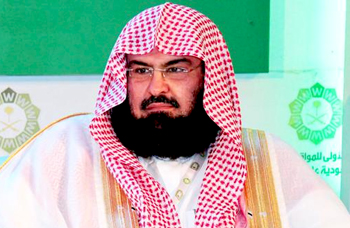Jeddah, Apr 5: Sheikh Abdul Rahman Al-Sudais, head of the Presidency of the Two Holy Mosques, said that the Kingdom’s efforts to defend the oppressed and deter the oppressors have added prestige, power and glory to the Arab and Islamic nations.
 In an interview with Saudi TV Channel 1, the widely respected religious scholar said Saudi Arabia has taken action which is supported by a number of Shariah laws.
In an interview with Saudi TV Channel 1, the widely respected religious scholar said Saudi Arabia has taken action which is supported by a number of Shariah laws.
Al-Sudais described Operation Decisive Storm, which was launched on the orders of Custodian of the Two Holy Mosques King Salman, “as a historic decision that came at the right time.”
“The wise and brave operation was initiated keeping in view the provisions of Shariah laws,” he said.
“It was not dependent on personal or political gains.”
He said any threat to the Kingdom and any evil intention toward the two Holy Mosques in Makkah and Madinah cannot be tolerated.
“There is no possibility of forgiving whoever tries to threaten or jeopardize the security of these Holy Mosques,” he said.
According to Al-Sudais, there is a need to protect Saudi and Yemeni interests.
Prophet Muhammad (peace be upon him) blessed Yemen and sent Ali bin Abi Taleb and Maaz bin Jabal and a number of his companions, he said.
“Under Islam, you are obliged to support your neighbors if they seek help,” said Al-Sudais.
The militias have foreign support, he added. They have their own agenda and they only wish to spread their domination over the Gulf countries, he said.
Al-Sudais said that Decisive Storm came after the Kingdom exhausted all efforts to contain the crisis through dialogue.
All nations need to stand together during times of hardship to serve the Ummah, he said.
He called on the people to get their news from authentic sources. “Do not pay attention to rumors spread through social networking sites,” he said.
Al-Sudais expressed gratitude to King Salman and highlighted his courageous position.
He also expressed appreciation to the Yemeni people whom he asked to remain united.
To the Saudi soldiers engaged in the noble action, he said: “May Allah grant you victory.”





Comments
Add new comment